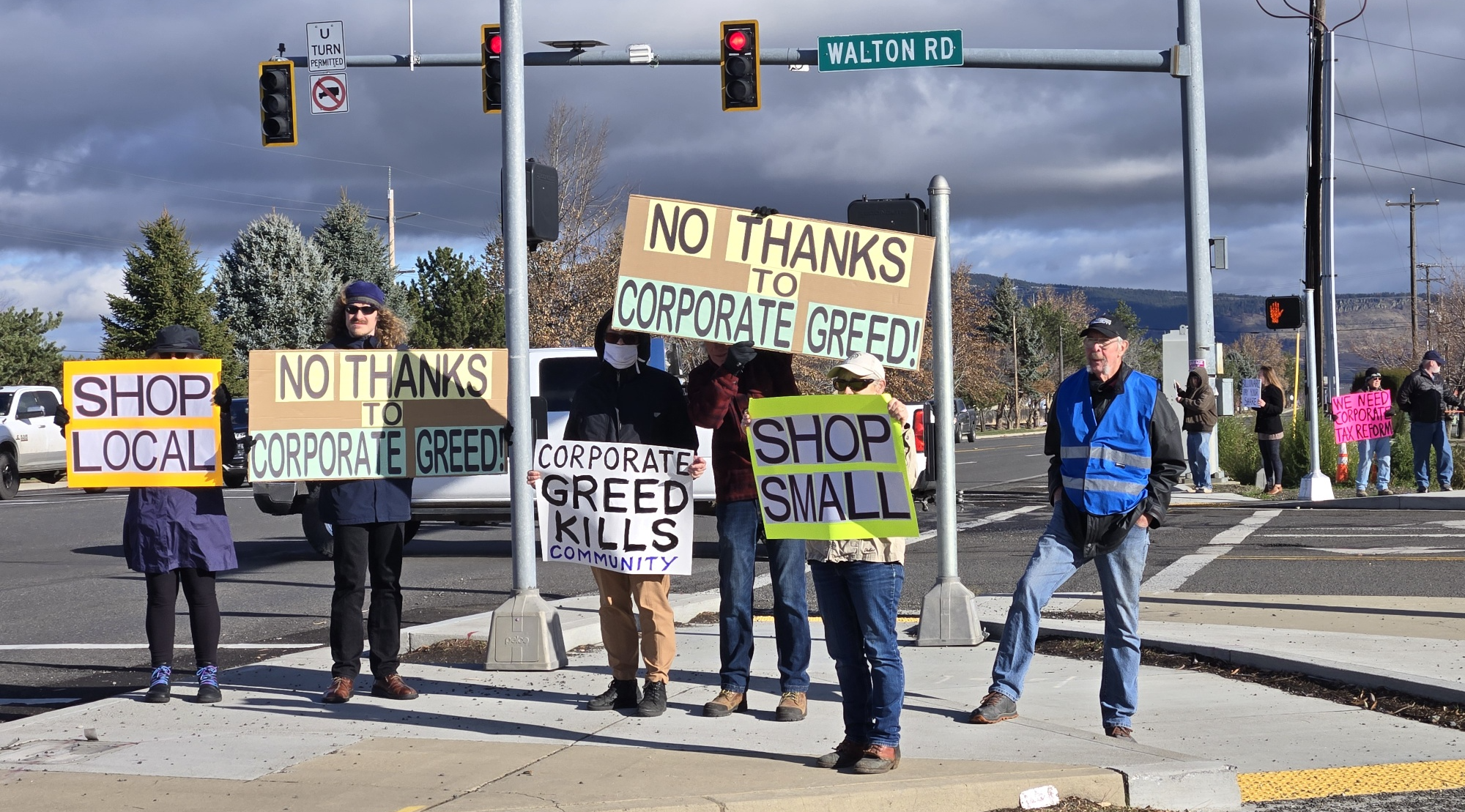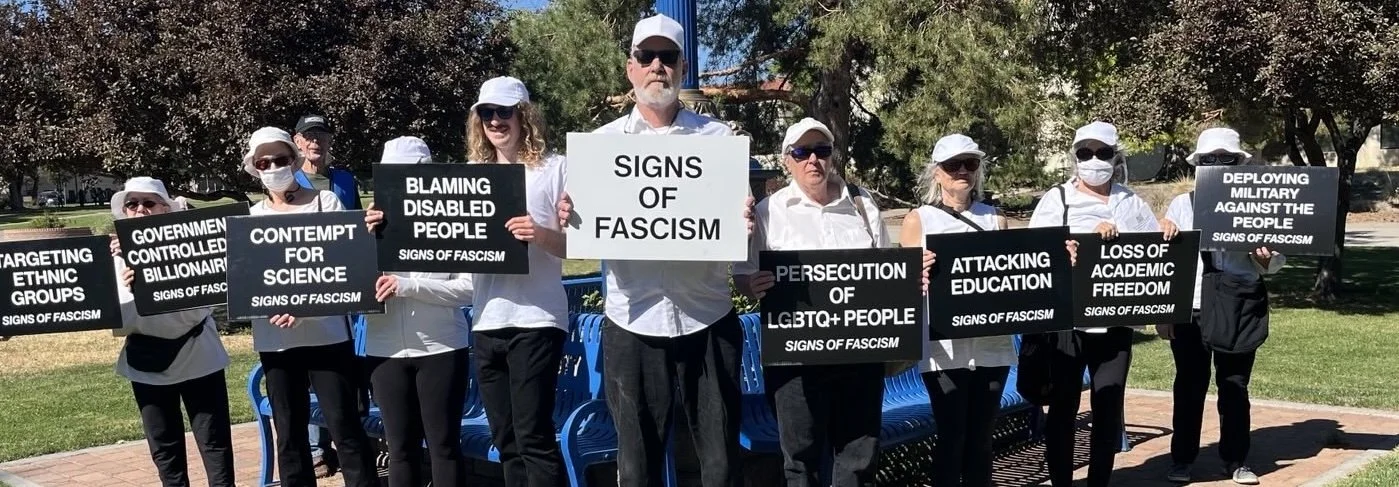“Democracy is under attack!”
“What do we do?”
“Stand up! Fight back!”
The words ricochet across a key intersection in our small town, in the streets I remember from childhood.
I probably know half the people clustered on the four corners and lining the main street to the center of town. Now they’re carrying signs and flags, yelling about fascism and detention camps. Their voices have a sharp, exhausted edge. This isn’t the first protest against the authoritarian power grab. It’s just about the tenth major rally to be held locally.
I’ve been in huge demonstrations in distant cities before, but I never imagined we’d have to do it here. Or that we could. This is a deep red county. Seventy-six percent of the county voted for Donald Trump (at least out of those who voted). This isn’t the kind of place you expect radical progressive protests.
But I’ve always known--better than most analysts in the cities--that the remainder of the people in these rural places are strikingly progressive. The divide between the staunch conservative rural base of the GOP and our progressive community of environmentalists, old and new hippies, rural academics, public workers and members of minority groups is sharp and steep.
When the threat of fascism became explicit, our rural towns rose with respectable numbers. In the spring we had as many as 500 at some of our protests, in a town of 12,000. But now we can barely raise 150, even on a holiday.
Some of the other organizers murmur with worry. What is it we’re doing wrong?
Recently, we sent out a survey to people who had signed up to learn about future protests, trying to gauge what the community wants. One comment read, “Get more organizers with good ideas!”
We got a good laugh out of that one at one of the planning meetings. But it was laughter tinged with anxiety.
Yes, we have dozens of volunteers and we love each one of them. Every small thing people do for this effort to defend democracy is essential. Some handout fliers, some do safety patrol at protests, some set up the sound system, even those who can’t leave their homes call new volunteers or promote events on social media.
But… it’s organizers we need--people who will commit to be there, to do it long enough to hold things together, to communicate flexibly and rapidly, to figure out what needs to be done and to let the volunteers know what, where and how to do it.
Yes, “more organizers with good ideas” indeed.
We have a handful, some of the best organizers I’ve ever worked with. And in such a small town, that’s amazing. But we are stretched to our limits across multiple areas of need and none of us was bored and looking for something to do when all this started. We have hectic, busy lives, jobs, school, kids or even just several other organizations we’ve committed to.
We chuckle at comments that appear to assume we are just casually slapping something together in our “spare time,” or that organizing isn’t even a real “task” like handing out leaflets, that we’re just people “who like to talk a lot.” We laugh because what else can we do?
If you haven’t done community organizing, it is impossible to imagine how much time and energy it takes to organize unpaid volunteers to put on the simplest event. Someone has to find the people, determine what time and place works for the most people (a process that almost always entails several days of verbal back and forth), figure out what materials are needed, find out where to get them or who has them, ask people to bring them or figure out how to bring the materials one’s self, confirm with volunteers closer to the event, find replacements for the inevitable 1 in 4 volunteers who drops out or gets sick, troubleshoot technical issues, notify and negotiate with relevant authorities, communicate to participants, publicize, write social media posts and press releases (or find someone reliable to do it), and on and on and on.
And that is the most basic version possible. That’s a full-time job.
The other comment we get sometimes goes like this: “You guys are just making this unnecessarily complicated. We don’t need organizing. Just tell people when to come to a protest.”
And there are towns where that’s all that happens. Maybe there’s a group or an individual with enough social clout that they can just announce something within their network and all the people who want to know find out. But even that most basic version is more complicated than the people saying this think.
Tell people WHEN to come? When? How does one know what works for the community or when major national events are happening? Both take paying attention as well as talking to a lot of people. Not to mention that you still have to tell people WHERE to come and it’s rarely a simple choice.
But the most difficult part of that statement is “tell.” How do you “tell” people in a town of 12,000 with no independent media?
Social media? Ha! I have thousands of followers and only 17 people see my posts. Facebook makes sure of that. I’m supposed to “promote” the post by paying into their profits. That’s the point. Most people might be on social media for fun, but Meta sure isn’t. They intentionally make certain that those who need and want to get information like this will not get it, unless you either pay or have an extraordinarily well-coordinated effort.
And then there’s the fact that most of us are only on a couple social media platforms. And gaining enough followers to have a chance to “tell them” in one’s local town--on just one platform--requires a couple hours work per day. We have volunteers who do this. They work hard. The “just tell them” folks have no idea.
Then there is the fact that a large proportion of the population here doesn’t do social media at all. So, we have a small troupe of volunteers who put up posters. We have an organizer who tries to get our events listed on various community calendars. And that’s just the “tell them” part of the equation.
There is no way around it. Holding a protest worth its salt is hard.
And if you can get organized enough to have people meet at the same time and the same place, there are a whole host of issues ready to bite you in the butt. The people who say we’re “too organized” are referring to the fact that we have a donated sound system and an information table and safety volunteers and volunteers who collect the email addresses of those who want to know when the next protest will be. And you could get away with not having some of that, if you just wanted to do it once and have done with it.
But what is the point of protesting if you’re just going to do it once and go home? Are you just out there to yell and let off steam? (OK, fair. Maybe some are. And that’s valid too, in a way.)
But that was not hyperbole when I mentioned “fascism.” This isn’t the post to list all the reasons why we need to stand up to this regime—detention camps, mass deportations, criminalization of political opposition, book banning, silencing of independent media, intimidation of journalists, economic policies designed to wipe out the middle class while padding the pockets of the rich, rounding up and punishing the homeless, coverups of massive corruption and sexual abuse at the very highest levels, threats, forced loyalty oaths, and that’s barely getting started.
This isn’t a post on WHY we should protest, because if you’re reading it, I’m assuming you know that. It’s about HOW. About strategy and tactics and group dynamics.
If you agree that we’re facing an authoritarian erosion of democracy. If you’re even slightly ready to call it “fascism,” it is worth doing this right. One does not fight fascism by just telling people to come to a little protest and then going home. Or one better not. Because at best you’ll be ignored.
So, here are ten basics that everyone involved in protests—both participants and organizers--should know about grassroots, resistance-style organizing:
1. Everyone is overstressed and overwhelmed. There are no “organizers with good ideas” except you and the person who got you involved and their friends and your friends. That’s it. We’re it. Too many people fall into thinking that your local organizers aren’t perfect, so it isn’t worth doing much until “the real organizers” show up. You know where that comes from? Accusations that progressive activists are paid actors. That’s the propaganda of the far-right creeping into our consciousness. No one is being paid. We’re all we’ve got.
2. And yet, experience does help. There are people who have been organizing and resisting longer than others. Some have amassed some serious skills and strategy along the way. But the only way to really tell who has experience is to observe people working. How do they handle crisis? Do they know the steps to organizing an event? Can they handle a meeting with an agenda and still listen to the feeling of the moment? Pay attention to the advice of those who have been at this for a while. Listen to and value elders, even if they aren’t the fastest or the most visible at protests.
3. As I showed above, what every group needs most are organizers. But organizers aren’t directors or authoritarians. Coordinators often get less personal say in how things go, not more. It’s a role that requires above all commitment. You don’t have to be there every day all day, but to be an effective organizer, you’ve got to be around most weeks and have at least a couple of days a week with some flexible time. People organize while working, parenting and handling full-time grad-school loads all the time. Most effective organizers aren’t people with “time on their hands,” likely because people with the capabilities to be an organizer aren’t capable of doing a lot of sitting around. That said, you don’t have to organize a big thing. Start with organizing a little thing—just the poster troupe or just the two-person team that calls back new volunteer recruits to get them onboarded or just the Instagram posting team. But if at all possible, don’t just volunteer. Organize.
4. If you can’t organize, for whatever reason, volunteer. Be aware that finding an effective volunteer task for you is a serious challenge, even though there are five thousand things to do. It’s often harder to narrow down one particular activity, show you how to do it, let you know when to do it, make sure you have the materials to do it than it is to just do it. If possible, volunteer for what you’re already good at. If you are a writer, offer to write or edit communications for the organizers. If you like to hang out online, get on the social media team. If you like to hang out on the street, run or ride a bike, get on the postering team.
5. Just about everyone who wants to protest wants protests to be big, with lots of people. The way you get lots of people is by having lots of active volunteers and multiple organizers. Other factors can play a role, like weather and the political climate, but these things are the most important pre-conditions. If you feel like your local protests aren’t big enough, get involved.
6. But don’t despair if the size of protests still fluctuates. We all know that some people can protest on weekdays and some can only protest on weekends. Those who protest on weekdays may actually be less available on weekends. Which day and what time you hold a protest will matter, and it’s a careful balancing act. Your local demographics, whether or not most of the interested people in your area are older or younger will matter. Is it a college town or a bedroom community or a suburb with young families? Similar demographic issues will determine whether summer, fall or spring are the best seasons for protest. Numbers may fall in the summer, because family schedules are disrupted and it’s too dang hot.
7. But the biggest factor is actually political climate. Big, shocking events will spark more interest in protest from large groups of people. It was relatively easy to raise large protest crowds in the early months of 2025. Now, exhaustion, resignation and despair are setting in for too many people. Does that mean we hang up our protest signs and just accept fascism? Hell no. Every single resistance movement in history has had to deal with similar pressures. It’s very rarely a sprint and almost always a marathon. A big part of being in the resistance is bringing other people back in, talking them through the despair, apathy and resignation, and sticking it out when too many have given up.
8. Big protests will come again. Just wait. Well, actually, please don’t just wait. That’s a figure of speech. Get organized and get ready, because big crowds will come at moments of major crisis and shock. They will come when the stress is highest. And if organizers aren’t ready and the structures of resistance haven’t been built, those large protests will have to start over again from scratch. If, on the other hand, we’ve been organizing and building networks and working groups and a skilled volunteer base, the next time protests get bigger, they’ll have several times the impact and we’ll take a step up to more strategic action.
9. The most important thing to build in the meantime are relationships within resistance networks. We build relationships by working together, learning one another’s strengths and weaknesses, and communicating well. Not everyone is going to do things the way you would. In fact, most won’t. Let people do their work the way they want or need to, as long as it gets done. Practice patience, tolerance and inclusion. We preach these values as progressives in our politics. They matter most in organizing. Stop and think very carefully before criticizing the work of others involved in the work of resistance. Are they truly doing something that’s going to harm or endanger someone? Or is it just not how you’d do it? Can you live with it and still do your part? When in doubt, don’t criticize. Remember how hard organizing is. Often there is no perfect decision an organizer can make, and they have to weigh your needs and wishes against the needs and wishes of other participants.
10. But at the same time, of course, do keep aware and be watchful. If you’re involved with resistance work long enough, you will encounter those who are disrupting resistance work, either for attention or ego trips, or rarely, because they actually are working for the other side. As we develop relationships, we learn who we can trust on a deep level. I may know Suzy-Somebody is a committed organizer and wouldn’t give up my name under torture, but I may also know that she rarely comes to events on time and isn’t the best person to entrust with bringing the essential materials we all need to get started. Learn who you can trust and differentiate between trust of good intentions and awareness of strengths and weaknesses.
That’s just ten of the most crucial tips for community organizing for resistance. I’m doing the work, so I’m particularly overwhelmed this full moon. I apologize for any typos and wish you all strength and good luck.
“Unite to stop the fascist coup!”
“If not now when?”
“If not us, who?”



















